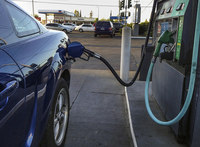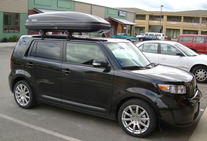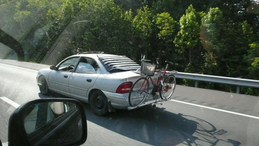 Money, Gas, and MPGs
Money, Gas, and MPGs First, despite the fact that I Do Not own a car, I am still contributing to many car created issues. The reasons are because while I do not own a car and I use public transportation, I do drive. I will borrow a car, rent a car, or drive my neighbor to the doctor with her car. So this GoingTrueGreen Blog post is also for everyone living in a city that doesn't own a car, but can rent or borrow a car for whatever reason.
Identifying the problem is easy, it is "Poor Gas Mileage," aka low MPGs or Miles Per Gallon of gasoline used. This costs us money and lots of it, because this slow extraction of our dollars paid per gallon is rarely noticed. If your car is only getting 17 miles per gallon and you should be getting a maximum of 32, something is wrong! Let us review the possibilities contributing to your money evaporation...
1) Tune Up:
When was the last time you had your car checked by a Double R car mechanic? That is to say, someone who is Reliable and Reputable. Do you actually know the person? Did you take the time to get to know your mechanic from "day one" and were you able to become friends?
2) Oil Change:
I ask the questions in number one because your Tune Up must include an Oil Change and new Oil Filter as well as a possible new air filter, spark plugs, and cleaning your fuel injector. This is why a Double R mechanic is so important. Thus, when you pick up your car, you know the job was done right.
3) Trunk Transfer:
We have all seen this, open a car trunk and there is no empty space! From lawn chairs to tire chains, beach umbrellas to snow shovels, a case of Windex to tool kits, sporting equipment to sleeping bags, and even additional spare tires.
All of the above is deadweight and that destroys your miles per gallon! Seasonal items must be taken out and put in your basement or closet until that season returns. If you are no longer Coaching the little league team, get the bags of equipment out and you know there is more than one bag. Stop dragging along the extra weight that is costing you money and not helping our environment.
4) Wash The Car:
Yes, a car covered with layers of dirt will destroy the aerodynamics of your car. Gas mileage will decrease and so will the amount of money in your pocket. Get a bucket of water (preferably rain water collected off the roof of your house or apartment building with a mesh filter screen), some all natural soap and wash your car! This is great exercise and therapeutic, because you worked hard to own or rent a car and being accountable helps us appreciate the value.
5) Windows, Open or Closed:
This one has variables, so let us review one at a time...
a) When you are driving around town, in a city, or in traffic, open your windows and enjoy the FREE air and breeze. If rain will enter through the open windows, then just open the vents in your car to let the air circulate.
b) When you start to increase speed, let us say above 40 miles per hour and will be driving at this rate for some time, such as on a highway, using the air conditioner in your car is more fuel efficient. When windows are open at high speeds, drag forces will build up and again, destroy the aerodynamics of your car.
6) Coasting:
This is Physics. Get your foot off the gas pedal when going down hill! The car's forward momentum will do just fine when going down a hill, so no need to keep pushing gasoline into the engine until you go below the minimum speed limit. Also keep the car in gear, don't put the car into neutral.
7) Big Mac Containers:
Look up on the roof! Is that a Ski Rack? No, it is Big Fast Food Container! Whatever you have on your car roof, if the roof rack, ski rack, or enclosed container, is not being used, then take it off. Even the best aerodynamic designed container will eat into your gas mileage. For example, instead of 26 miles per gallon, you will only get 23 miles per gallon. Also if you have a Bike Rack on the back and it's not needed, take it off!
Short or long trips all can have traffic. Use your Internet connection to get a bird's eye view of the roads and the traffic situation. With this data you can plot alternative routes with your GPS to avoid the traffic jams and save money.
9) Got Gas:
There is no harm in reviewing the type of gasoline you buy and what is best for your car's engine. Check your owner's manual or with your reliable and reputable car mechanic. Also never buy gas at a station that just had a delivery. Wait until tomorrow so all the sediments and dirt settles. You don't want to pump that stuff into your car.
10) Early Bird Gets More Gas:
This is some wild physics that gets you more gasoline for the buck. Try to always fill up your gas tank early in the morning! All petroleum has more density under colder temperatures and that tank in the ground is coldest early in the morning. All gas station pumps deliver gasoline based on flow rate, so if one gallon is provided within 10 seconds, you will receive more fuel in that 10 seconds when under cold morning ground temperatures compared to the afternoon. For example, if the morning ground temperature is 59 degrees Fahrenheit compared to a hot summer afternoon when the ground temperature may reach 95 degrees, you will receive about 2.5% more gasoline for the same money.
11) Bill Of Goods:
Don't be sold a Bill of Goods when it comes to all the magic pills, liquids, and contraptions, to INCREASE fuel efficiency. The only magic here is a DECREASE in your money for the majority of the cases.
12) Beautiful Colors:
When buying or renting a car, pick a light color interior. Unless you live where cold weather prevails most of the year. With light color on the inside, the less your car's air conditioner has to work. End result is better gas mileage.
13) Check Pressure:
We all should know this one, How much air should be in your tires and check the air pressure often! Again, your owner's manual is the source to learn how much air pressure should be in your tires. Also you need to check the tire pressure before each trip and at least once a month.
So when the rubber hits the road with all of the above in mind, you should have up to 15% better miles per gallon. Translated into money, here is one example: If you spend $1,200 a year on gasoline, that will be a $180.00 savings. Not bad, just more money to save towards that electric solar recharged Tesla car!
Bill Lauto , GTG
Environmental Scientist
International Sustainability and Energy Consultant
Contribute your comments!
























